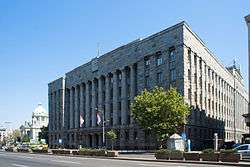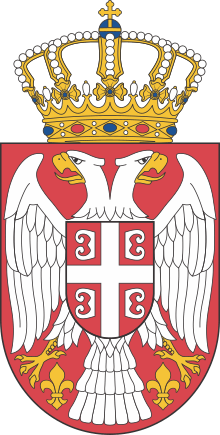Constitutional Court of Serbia
The Constitutional Court of the Republic of Serbia (Serbian: Уставни суд Републике Србије; Ustavni sud Republike Srbije) is the court authorized to perform judicial review in Serbia. It rules on whether the laws, decrees or other bills enacted by the Serbian authorities are in conformity with the Constitution. It is not considered as part of the judicial branch, but a court sui generis. The Constitutional Court is authorized by the Constitution itself and the Law on the Constitutional Court.[2]
| Constitutional Court of Serbia Уставни суд Републике Србије | |
|---|---|
 Building of the Constitutional Court | |
| Established | 9 April 1963 |
| Location | Belgrade, Bulevar kralja Aleksandra 15 |
| Composition method | Parliament selection (5 members) Supreme Court of Cassation selection (5 members) Presidential selection (5 members) |
| Authorized by | Constitution |
| Judge term length | 9 years |
| Number of positions | 15 |
| Annual budget | €3.72 million (2020, planned)[1] |
| Website | www |
| President | |
| Currently | Vesna Ilić-Prelić |
| Since | 3 February 2014 |
 |
|---|
| This article is part of a series on the politics and government of Serbia |
|
|
Legislature
|
|
Judiciary
|
|
|
The seat of the Constitutional Court is in Belgrade. It consists of 15 judges, one of them being President of the Court.[3]
History
The Constitutional Court of the Socialist Republic of Serbia (then part of SFR Yugoslavia) was established on 9 April 1963 as an independent body of the Republic and designated to protect constitutionality and legality in accordance with the Constitution and within the framework of the rights and duties proscribed by the 1963 Constitution of SR Serbia. The Constitutional Law of Serbia, enacted on 25 December 1963, defined jurisdiction and adjudications before the Constitutional Court and legal effects of its decisions in a more specific manner.
The Constitutional Court of Serbia commenced its work on 15 February 1964. The Constitutional Court has upon proclamation of the 1990 Constitution of Serbia acted within the framework of absence of division of powers, where the Parliament was the highest body of state power. The Constitutional Court has through its presence and work contributed to the importance and contribution in preservation of the constitutional principles and legality.[4]
Composition
The Constitutional Court consists of 15 judges. Five of them are elected by the President of Serbia, five by the National Assembly, and five are elected at the General Session of the Supreme Court of Cassation. Judges are elected to the 9-year term. The candidates have to be accomplished lawyers of at least 40 years of age and with at least 15 years of experience in jurisprudence. One person can be elected to the Court a maximum of two times. After the election, the judges take oath before the President of the National Assembly.
The term of the Constitutional Court judge ends after 9 years since the election, or by resignation, by retirement or by impeachment. A Constitutional Court judge may not perform any other public office or any other job at all, except for being a professor at the Law School of one of the universities in Serbia. A Constitutional Court judge enjoys immunity from prosecution.[3]
Composition as of 2020 (year of election given in the parenthesis):[5]
- Snežana Marković (2016), President (since 2020)
- Gordana Ajnšpiler Popović (2019)
- Lidija Đukić (2019)
- Tatjana Đurkić (nee Babić) (2016)
- Dragana Kolarić (2016)
- Tamaš Korhec (2016)
- Vesna Ilić Prelić (2007)
- Miroslav Nikolić (2016)
- Vladan Petrov (2019)
- Nataša Plavšić (2019)
- Jovan Ćirić (2016)
- Milan Škulić (2016)
- Tijana Šurlan (2016)
Two seats (including the Deputy President) are currently vacant, as of March 2020.
Presidents of the Constitutional Court
- Status
| No. | Portrait | Name (Birth–Death) |
Took office | Left office |
|---|---|---|---|---|
| 1 |  |
Petar Relić | 26 June 1963 | 31 July 1971 |
| 2 |  |
Jovan Đorđević | 15 July 1971 | 31 December 1979 |
| 3 |  |
Najdan Pašić | 1 January 1980 | 14 October 1984 |
| 4 |  |
Radoslav Ratković | 18 September 1984 | 7 November 1986 |
| 5 |  |
Đurđe Seničić | 5 May 1987 | 3 June 1989 |
| 6 |  |
Miodrag Bogdanović | 3 June 1988 | 26 June 1990 |
| 7 |  |
Balša Špadijer (born 1936) |
7 August 1990 | 30 June 1996 |
| 8 |  |
Ratko Butulija (born 1941)[lower-alpha 1] |
30 June 1996 | 17 December 2001 |
| – |  |
Verona Ádám Bokros (born 1948) |
17 December 2001 | 20 June 2002 |
| 9 |  |
Slobodan Vučetić (born 1941) |
20 June 2002 | 10 October 2006 |
| – |  |
Verona Ádám Bokros (born 1948) |
10 October 2006 | 10 April 2007 |
| – |  |
Milutin Đuričić (born 1948) |
10 April 2007 | 10 October 2007 |
| – |  |
Dragica Marjanović (born 1943) |
10 October 2007 | 26 December 2007 |
| 10 |  |
Bosa Nenadić (born 1953) |
26 December 2007 | 23 December 2010 |
| – |  |
Agneš Kartag-Odri (born 1951) |
23 December 2010 | 3 February 2011 |
| 11 |  |
Dragiša Slijepčević (born 1955) |
3 February 2011 | 3 February 2014 |
| 12 |  |
Vesna Ilić-Prelić (born 1960) |
3 February 2014 | 12 December 2016 |
| – |  |
Goran Ilić (born 1965) |
12 December 2016 | 26 January 2017 |
| (12) |  |
Vesna Ilić-Prelić (born 1960) |
26 January 2017 | 26 January 2020 |
| 13 |  |
Snežana Marković (born 1959) |
26 January 2020 | incumbent |
Library of the Constitutional Court
The Library of the Constitutional Court was formed after the Court had been established. According to the profile of its collections, the Library of the Constitutional Court is a specialized law library. The library is in charge of collecting, storing, cataloguing, and circulating literature from different branches of law, with special regard to constitutional legislation. The Library is in possession of a large collection of monographs, serial publications, and collections of papers. In addition, it has an electronic database of legal acts.
The Constitutional Court Library owns a valuable collection of legal acts issued in the late 19th and early 20th centuries. The Library cooperates with the head office of Belgrade City Library, National Library of Serbia and other libraries of similar profile.[8]
Notes
- Acting to 25 December 1996.
References
This article incorporates text from the Constitutional Court of Serbia official site (), which is in the public domain, because it is a law, decree, regulation or official material of a Republic of Serbia state body or a body performing public functions, under the terms of Article 6, Paragraph 2 of Serbian copyright law. See Copyright.
- "ЗАКОН О БУЏЕТУ РЕПУБЛИКЕ СРБИЈЕ ЗА 2020. ГОДИНУ" (PDF). parlament.gov.rs. Народна скупштина Републике Србије. Retrieved 20 February 2020.
- Constitutional Court of Serbia official site: Law on the Constitutional Court
- Constitutional Court of Serbia official site: Election, appointment and termination of office (in Serbian)
- Constitutional Court of Serbia official site: The history of the court from its foundation
- Constitutional Court of Serbia official site: Composition
- "Raniji predsednici Ustavnog suda". ustavni.sud.rs. Constitutional Court of Serbia. Retrieved 21 November 2018.
- "Serbian ministries, etc". rulers.org. B. Schemmel. Retrieved 21 November 2018.
- Constitutional Court of Serbia official site: The Library of the Constitutional Court of the Republic of Serbia
External links
- Constitutional Court of Serbia Official page (in English)